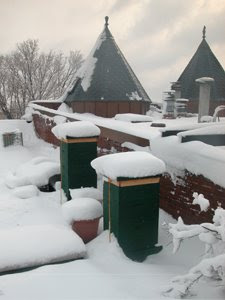
Here in New England we've been having a cold spell - many days of teens and lower temperatures. How do bees handle this cold weather?
Well, it turns out that bees have a unique way to survive the cold weather, while maintaining a healthy temperature in their hive.
When the season starts turning toward fall, the beehive will start to prepare for the winter. Drone bees (the males who do nothing but lay around, wait for mating flights, and consume food) are unceremoniously kicked out of the hive (whereupon they die, since nobody is willing to feed them). As the weather gets colder, the bees which are left form a "ball" where they vibrate their wing muscles. This activity generates heat, and the queen in the center is nice and toasty. The bees on the outside circulate towards the center, and the bees in the center move to the outside, in order to give everyone an equal chance to help generate heat.
Since the hive is warm, and the air and outside is cold, condensation forms in the hive. Dripping water is a danger to the beehive - bees can survive the cold just fine, but wet and cold will kill them. Therefore, a hive needs to be slanted slightly so the moisture doesn't drip down on the center of the hive (where the bees are).
Because the bees are all clustered together in the center of the hive, they don't go foraging for food (the temperature needs to be around 50 degrees before the bees will fly out of the hive). They must survive on the honey they have stored up in the hive. But the honey needs to be reachable by the hive cluster - it can't be too far away, or the bees will starve. I've heard of stories of hives dieing with good honey just a few frames away. So sometimes beekeepers need to supplement the honey with sugar syrup (if it is not too cold) or granulated sugar.




